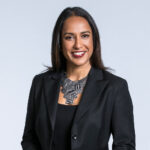“The sense of otherness is there ALL the time – everyday. I sometimes feel it very acutely. And I don’t think that shifts with time or experience…. The sense of otherness is always there.”
This is what one senior woman leader told Intersection and Chief Executive Women during our research into the experiences of culturally and racially diverse women in leadership in corporate Australia.
Her reflections were common.
Almost everyone we interviewed relayed their experience of discrimination, barriers, and racism resulting from the way leaders and peers reacted to their colour, accent, name, cultural practices, their dress or hair reflective of their culture or race or their different career trajectories.
They told us they felt the constant need to adapt and fit in with western models of leadership. All this in addition to the barriers they face as women in the workplace.
Yet our research points squarely to the fact that, while the discussion of gender in the workplace is advancing, race is rarely mentioned, and racism remains a taboo word.
“They almost don’t care what the women look like – but I do, as we’re just replacing old white men with slightly younger White women.”
Australian workplaces are well behind international counterparts and need to get serious about cultural and racial diversity.
If we do not explicitly address structural inequality, we will inevitably make these worse. We need to understand the intersectional differences that all of us experience and how they have been used to create inequalities between us. We all have a cultural and racial identity. If we fail to recognise how these shape our lives, and how they disadvantage some of us, the benefits of gender equality initiatives will flow largely to White women. Certainly, that is what the data shows. It is the same with class, age, sexual orientation, gender identity, and (dis)ability.
If we are to make progress, we need to have honest and open conversations about who we are.
Yet, for many of the women leaders we spoke to, this was the first time in their career that they had been asked to reflect on how their gender and race may have impacted their career trajectories. Our conversations revealed that race was hardly ever discussed in the workplace.
Most of the women we spoke to considered that now is the time to change up the conversation and talk about gender AND race in corporate Australia.
To have an effective conversation, we need to be able to name the issues. But the language we use in Australia, most often, “cultural and linguistical diversity”, is neither accurate nor sufficient.
The language of ‘diversity’ is problematic, bringing with it a comparison to an invisible norm that remains unscrutinised or uncritiqued. Just as most cis men are able to walk through life rarely thinking about their sex or gender, Whiteness is generally an invisible characteristic, and White people are rarely asked to consider how their race has privileged their careers. In our report we wanted to name this privilege. The language of Whiteness sometimes makes White people uncomfortable or defensive, but that is exactly why it is important to name it.
It is good to see the Australian Government is working on the weaknesses in our terminology and data collection. The Workplace Gender Equality Agency is working to assist workplaces to capture consistent diversity demographic information and the Minister for Immigration and Multicultural Affairs, Andrew Giles, has committed the Government to improving data collection on race, culture, and ethnicity more broadly.
Our research revealed some pathways forward for Australian workplaces. Put simply they come down to good leadership and active allyship.
Our interviewees spoke of the critical importance of sponsors, mentors and the need for leaders to provide access to networks. High potential women are often over-mentored and under-sponsored, compared to men, but it is sponsorship – the act of advocating for people who may not otherwise have access to leadership – that is the most effective.
Many of the leaders we spoke to in our research were conscious they were carrying the ‘cultural load’ of raising awareness of race and addressing issues of racism in their workplaces. Sometimes this was seen as rewarding, but it was often also exhausting and difficult. Many of the women we spoke to told us how important it is when White colleagues step in as allies.
Leaders can help staff build the courage and space to be effective allies by demonstrating this behaviour, while recognising and rewarding others who do the same. Leaders should communicate their expectation that staff should support their colleagues and that it is safe for them to do so.
Leaders cast a long shadow on workplace cultures, and often it is difficult for them to receive genuine feedback on their impact. We call on leaders to engage in deliberate self-reflection about cultural assumptions and biases, acknowledge mistakes, and commit to self-improvement.
They must make sure there is always space for people to talk about their different experiences, and to create safe working environments for everyone. These conversations will not help, however, if people do not feel safe to raise these issues. As one senior woman leader told us:
“Fortunately, I’m at leadership level where I’m like: here I am! But it’s taken me probably until the role before this one where I could – I still remember almost feeling like I could just exhale and let my shoulders down and I was just like… I’m going to be me. But it took a lot. I had to be quite senior before I felt that way. And even to this day, there’s still stuff I need to be a little mindful of, depending on my audience.”
The need to feel safe applies to culturally and racially diverse women as well as to White colleagues. Leaders need to assess their organisation’s culture, set goals and measure progress. And they need to take action in response.
The next step is to take a more nuanced and sophisticated approach to dealing with difference in our workplaces. We must recognise how gender and race intersect, along with all the multiple other facets of our identities, to create different lived experiences in the workplace for each of us.
“Having more diversity will attract more diversity. There is something in numbers.”
Few policies will be able to encompass the differences between us all. This is why it is a matter of leadership and of allyship, of engaging with all our colleagues, making sure our workplaces are welcoming for us all and holding ourselves and each other to account.
Please note: photo at top is a stock image






